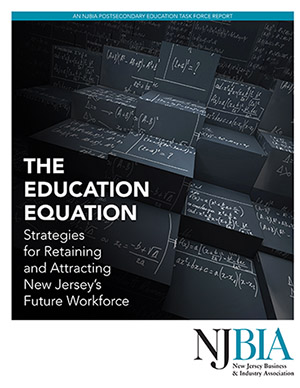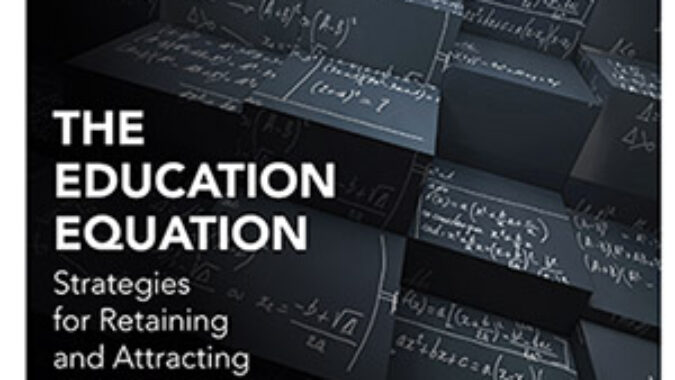 The New Jersey Business & Industry Association today released a report developed by an NJBIA task force whose mission is to keep millennials in New Jersey by matching education programs to private sector jobs.
The New Jersey Business & Industry Association today released a report developed by an NJBIA task force whose mission is to keep millennials in New Jersey by matching education programs to private sector jobs.
The Education Equation: Strategies for Retaining and Attracting New Jersey’s Future Workforce, the first deliverable from NJBIA’s Postsecondary Education Task Force, offers recommendations to stem millennial outmigration as the Murphy-Oliver administration and the Legislature consider goals and policy directions for the future of New Jersey’s workforce.
The task force also looks to build a dynamic brand for New Jersey higher education and to build career readiness standards into all curriculum in K-16 education.
According to the U.S. Census Bureau, New Jersey has the highest millennial outmigration in the country, with a total net loss of 183,591 millennials from 2007 to 2016.
“This framework will help us fulfill our mission to better prepare, preserve and place New Jersey’s future workforce at this critical time,” said NJBIA President and CEO Michele Siekerka. “To ensure our future workforce, our education programs must be aligned with the needs of the private sector. Without it, New Jersey will continue to see millennial outmigration negatively impact our business community and the state’s economy.”
NJBIA’s Postsecondary Education Task Force includes 100 prominent members from academia, state education and labor departments, businesses and non-profits from the private sector and millennials.
The full Education Report can be found here. Some of the recommendations made by the task force in the Education Equation report include:
- Improved attractability through the promotion of benefits of staying or coming to New Jersey for postsecondary education; the improved collaboration between government agencies, workforce employers, educational institutions and industries; and the promotion of career pathways and opportunities offered by the state.
- Increased affordability through the responsible and consistent by government into postsecondary education; the development of cost-saving models for students to achieve stackable credentials and/or degrees; the reduction of remedial education; and reviewing the process for transferability of credits.
- Skill building through the enhanced capacity for Career and Technical Education programs as standalone and K-12 programs; the creation of employer-driven training programs to help prepare students for jobs of the future; and the promotion and expansion of apprenticeship and internship programs.
- Enhanced career exploration and education through the training of counselors, teachers and parents on career awareness and proper career guidance; the in-school employment services (including assistance with resume writing, mock interviews and job fairs); and the creation of curricula that includes work-based experiences.
The Postsecondary Education Task Force evolved from NJBIA’s Workforce Development Summit in May, 2017, where leaders discussed topics such as effectively branding higher education, skill building and career pathways, and the demographics, economics and workforce issues surrounding the millennial generation. Throughout 2017, the group of leaders continued to discuss these various issues at length.
From 2007 to 2016, a total of 1,050,097 millennials migrated out of New Jersey while 866,506 millennials (domestic and international) migrated in to the state, according to the U.S. Census Bureau. High school seniors and young adults (aged 18-24) accounted for 58 percent of the millennial outmigration in that span.
“New Jersey taxpayers invest, on average, more than $20,000 per pupil per year for K-12 education and when students and millennials leave, the state gets no return on its sizable investment,” Siekerka added. “Our task force will continue to work on strategies to build a more dynamic brand for New Jersey higher education and more affordable pathways to post-secondary education.”
“Despite our ideally centralized location, nationally recognized high school academics, quality higher education institutions, and our highly educated and skilled workforce, New Jersey struggles to retain and attract young millennials,” said NJBIA Policy Analyst Nicole Sandelier, who authored the report. “To ensure the future of New Jersey’s workforce and economy, there must be comprehensive dialogue to create solutions that seek to retain the states’ young people while attracting out-of-staters to the Garden State.”

